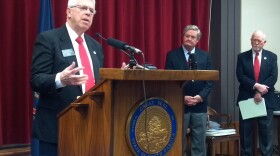The so-called “surge” bill is a step closer to passing.
The House Appropriations Committee voted 20 to 2 to approve the amended bill. If the House and Senate agree, it will be on Governor Dalrymple’s desk next week – and once it’s signed, the $1.1 billion dollars in the bill can go toward infrastructure projects -- meaning state and local governments can bid projects for the 2015 construction season.
Rep. Tracy Boe (D-Minot) was one of the two “no” votes. He says he doesn’t like the “surge” concept.
"We had the opportunity in prior sessions to fund the needs," said Boe. "We should be doing that instead of catching up all the time. We're never going to get ahead of it unless we address it, and do it in a comprehensive plan instead of just hurrying up and doing this in a hurry."
The other “no” vote came from Rep. Bob Martinson (R-Bismarck), who would only say that his vote speaks for itself.
Rep. Jon Nelson (R-Rugby) voted for the bill – but he has some reservations. He says there are infrastructure problems across the state – and he doesn’t think there’s enough money in the plan for non-oil producing areas.
"We need to do this, obviously," said Nelson. "But I don't want us to forget that there are infrastructure needs in other parts of the state as well."
The bill will be on the House floor tomorrow (Friday). Senate Majority Leader Rich Wardner (R-Dickinson) says the plan is to have the Senate concur with the House amendments – and it will likely be on Dalrymple’s desk by Tuesday or Wednesday.
Here are some of the parts of the compromise:
-State Department of Transportation: $450 million, up from $300 million;
-Big ten oil producing counties: $240 million, down from $300 million;
-Big ten counties cities: $100 million, down from $140 million;
-Hub cities: $172 million, down from $215 million;
-Bakken boundary cities: $10 million, down from $21.25 million;
-Non-oil counties: $112 million, down from $140.8 million;
-Non oil townships: $16 million, down from $19.8 million.

